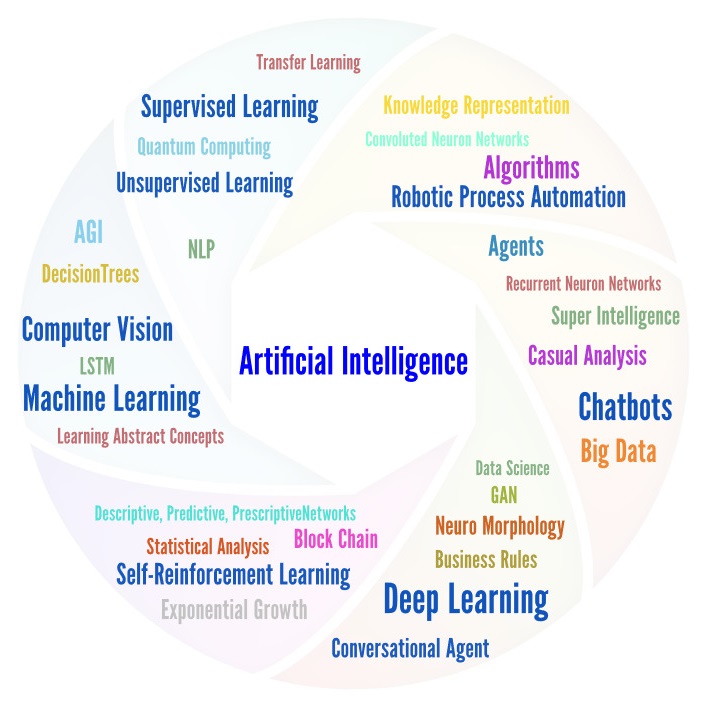
What are GeoSmart AI Solutions?
Artificial Intelligence (AI) is a set of smart tools and methods complemented by IOT-driven big real time data that help us solve many types of problems across various industries; this is achieved by applying principle design thinking and augmenting our cognitive capabilities through predictive analytics based-outcomes. Furthermore, the “Geo” component brings the space dimension, and the “Smart” component brings the policy, governance, transformative strategies, and all corresponding emerging and trending technologies such as IOT, Big Data, Cloud platforms, etc. This makes overall the “GeoSmart AI” solutions.
The Why?
Since mid this century until present, AI has evolved as various forms of , intelligent computing and sentient apparatus that augment human capabilities in cognitive as well as motor skills such as , smart recommendation engines, bots, etc. From enterprises point view, this accelerates efficiency and productivity including time and cost savings in relation to digital transformation with value add in the organizations’ decisions & policy making, value chains and process automation, as well as empowers a range of services (and products) offered by those organizations, which provides substantial economic benefits. The applications and benefits of GeoSmart AI span various private and government organizations across multiple industries; especially those who lead digital transformation efforts and apply design thinking principles.
As a consequence, we at GPC Group, envisage GeoSmart AI as a natural continuation or extension of our GeoSmart solutions and services. Thus, it threads across our consultancy, technical and managed operational services as required and needed by our clients.
The How?
GeoSmart AI implementation could span one or several activities as follows:
- Roadmap Development and POCs Prioritization:
The roadmap comprises all key components as described in GPC methodology i.e. assess, plan, implement and adapt as described in more detail under the roadmap service. Particularly, the GeoSmart AI business case (s) and priorities are identified during the roadmap development in addition to key relevant topics such as ethics principles to be followed during implementation as well as information security strategies to name a few. The latter may comprise, for example, adopting a hybrid approach for cloud infrastructure and local data hosting to cater for protection of sensitive information.

- Setting up the Platforms and Infrastructure: This involves setting up the communication and computing infrastructure, ensuring platform interoperability while embedding AI tools and services in clients IT environments, arranging data management environment, as well as addressing enterprise systems integration requirements
- Developing and Rolling Out the AI tools: This comprises developing and configuring, as necessary, custom as well as pre-built tools. This may include prediction engines, chatbots (with natural language processing capabilities), data science and representation tools & methods, vertical services or solutions offered by 3rd party service providers, various types of SDKs, etc.
Our Partners
In order to deliver on GeoSmart AI solutions for our clients, we work closely with our partners on various aspects of digital transformation:








Case Studies
- e-NOC Program Business Rules: As part of the e-NOC program, a GeoSmart solution was designed, developed, and rolled out in the context of providing common government approvals and no-objection-certificates for utilities and infrastructure among various stakeholder entities. The system collects observations of data input by end users on the transactions and analyzes them versus smart decision trees to help automate business processes and distribution of transactions to various stakeholders across multiple disciplines. Furthermore, the system is designed to capitalize on a supervised learning process where the business rules are adapted over time based on input received from the end users as part of operations. Building on the relatively complex operations with data streaming from 25+ organizations, the system is projected to turn the operational data into a rich knowledge and to become more intelligent being augmented by adequate predictive tools and methods.
- Automated Plan Review (APR) for Building Permits: A POC was applied recently in joint collaboration between GPC and SmartReview to generate compliance reports for plans submitted by consultants for review based on Building Information Management (BIM) input and pre-configured International Building Code (IBC) businesses rules. The purpose is to streamline the efficiency of the permitting process in terms of reducing time and improving quality of the compliance outputs. As a result, potential time savings due to the review process automation were identified to be from weeks to days, resulting in benefits to all stakeholders including citizens, investors, consultants and the municipalities. As the data accumulates over time part of operations, the GeoSmart capability is intended to be augmented with specific AI plug-ins to further empower design and compliance recommendations and insights to both consultants and permit reviewers.
- AI for Topo Basemap Production: GPC is currently collaborating with Digital Globe and EcopiaTech to provide the Kabul local authorities with AI services applied to satellite imagery with the objective of automating production of vector topo basemap data comprising a variety of key features such as various types of buildings, physical structures, etc. The initiative has undergone an initial POC and is projected to be extended to a wider area coverage in the future.
- Afghanistan Urban Management Information System (UMIS) Proof of Concept (POC): Under the aegis of the World Bank, GPC has proposed the development of a UMIS POC to support government urban planning and capital infrastructure planning & development activities. The comprehensive solution comprises policies & governance and a technology solution component. As part of the latter, GPC will collaborate with Ventana Systems to demonstrate the use of “causal-analysis modeling” capabilities that would support augmenting the UMIS smart prediction analysis and forecasting activities.
Resources/ Latest Trends in the Industry
We, at GPC, constantly observe the trends in the industry and adapt our solutions to the market needs and requirements. Some of the AI trends we feel have the most potential for advancing the GeoSmart concept include the following:
- Unsupervised Learning: Machine self-learns by accessing data based on pre-defined principles and findings patterns without human intervention (i.e. supervised learning) which is required in the latter case to classify and label the AI input variables;
- Integrated Policy & Valuation Simulations in Decision Trees: This notion balances policy and valuation as part of the deep learning process (e.g. the DeepMind AlphaZero experience) which could reduce reliance on big data via self-generated data. This technique would use reinforcement learning, among other techniques, to derive experience-driven sequential decision-making by interacting with the environment to learn and move towards a goal that rewards the actions taken;
- Learning Abstract Concepts: By establishing the capacity to reason about abstract concepts which requires dynamic model building;
- Transfer Learning: A research problem in machine learning that focuses on storing knowledge gained while solving one problem and applying it to a different but related problem.

